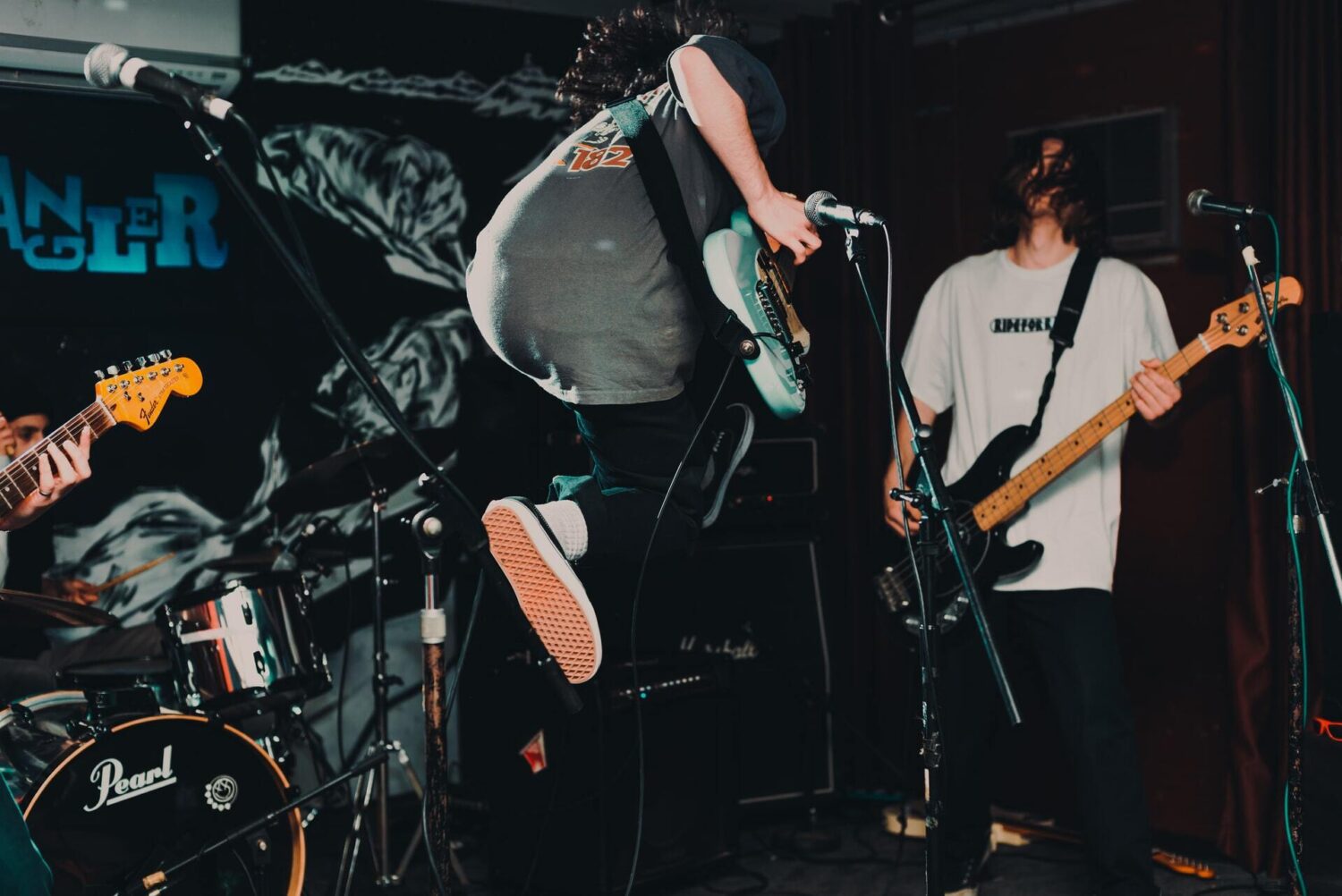
Download Your FREE 22-Day Single Release Plan
7 Ways To Motivate Your Bandmates Effectively
Contents [ ]
- 1. Purpose - What's The Point Of The Band?
- 2. Agreement - Everyone's On The Same Page With The Same Goals
- 3. A Positive Vibe - Make Sure Your Bandmates Are Happy
- 4. Allow For All Band Mates' Self-Expression
- 5. Awareness Of Band Members' Musical Roles
- 6. Criticism - How To Motivate Improvement
- 7. What Does The Band Sound Like? Are They Good? Hell Yeah!
A successful band plays to everybody's strengths.
Keeping your members motivated is how you can enable growth and actually achieve your goals.
If you don't want your band to fail, check out these tips for keeping your fellow bandmates motivated and fighting for the cause.
1. Purpose - What's The Point Of The Band?
One thing that motivates everyone is a sense of purpose.
There is perhaps no field where this is more relevant than in music, where every band member has a particular role to perform in order to help produce a cohesive group sound.
To motivate your bandmates with this sense of purpose then, make sure everyone within the group is on the same page regarding what the band is for, and what type of gigs you want to get.
Are you writing original songs and seeking out slots at festivals to eventually gain recognition all around the world?
Is your band put together to perform a weekly boozy pub gig of pop and rock covers?
Is your band a highly experimental art project who are content to create weird soundscapes in the bass player’s mum’s basement?
Before you outline your music marketing strategy or even come up with a band name and image, define a purpose.

2. Agreement - Everyone's On The Same Page With The Same Goals
Once you’re all in agreement as to what your goals are as a band, it becomes far easier for band members to obtain and retain a sense of purpose. Once there’s clarity on this front, you’ll all have clearly defined indications of how well you’re succeeding as a band in relation to what your goals are:
For the original projects, you’ll be motivated by making headway in the music industry, getting more Spotify streams, playing shows and seeing your songs connect with an audience, and growing a fanbase dedicated to hearing you.
For the pub covers bands you’ll be motivated by hearing happy patrons singing along to familiar tunes and a regular sum of cash at the end of the night.
For the experimental collectives, you’ll be motivated by creating new sounds that have never been made before (and perhaps never will be again). Maybe that first gig will never materialize but that's not what your band's about.
The motivation for a band can vary widely, but as soon as every member is crystal clear on what the point of the band is, they can then clearly outline for themselves exactly what their role is in terms of being a part of that group, and that they're in it for the same reasons as the other musicians. This can help you recruit the right musicians for your band.
Making sure that the purpose of the band is clear also prevents disputes that could arise from certain members having varying ideas over what the band is about, what they want to play, and how many and what types of gigs they're playing.
There's nothing quite like being in a group of like-minded friends with a common goal.

3. A Positive Vibe - Make Sure Your Bandmates Are Happy
One area to address in a band is the ‘vibe’: the mood or feeling that your bandmates get from being in the band. A key thing to do in this department is to cultivate a positive environment.
Of course, the actual overall vibe of the band is going to be determined by a combination of everyone’s actions, but you can help to influence the way others feel by being friendly and by respecting everyone’s contributions.
If this seems obvious, it’s because it is, but nevertheless, it’s always going to be helpful to mindfully keep that positivity flowing, especially in the face of band-specific circumstances such as when in the midst of stressful gigs, setting up in a tight space, or dealing with difficult clients, unfriendly stage managers, inept sound engineers, etc.
The longer a band has been together, the more important the need for positivity becomes because it’s always possible that the shine of the music and the money made from it can wear off for individual bandmates over time, especially for players who work in multiple bands.
At this point, the only thing keeping a band together can be the positivity and the goodwill and kinship between band members.
4. Allow For All Band Mates' Self-Expression
A good band leader will allow everyone the space for self-expression where possible. Music is an art form and many musical artists need to be given ways to express themselves in order to fully enjoy the compositions they are playing.
It's rare for other band members to be in the game of playing music purely to serve the rest of the band and the bandleader's ego.
A surefire way to motivate people is to be aware that they are there to be making music, and that it should be fun for everyone to play as well as for audiences to hear.
Whether that means collaborating on the songwriting process (or arrangement process if you’re covering songs) or stuff like allocating solo spots for instrumentalists, the other members of the band need a way to make their voices heard.
Just something like delegating the lead vocal out to a backing singer on a particular number - or allowing the guitar player to write lyrics - might be enough to make the guys in the group feel more interested and creatively engaged.

5. Awareness Of Band Members' Musical Roles
One way to motivate bandmates is to take an active interest in their musical role. If your guitarist has just played a killer solo on stage, tell her that. Similarly, if your drummer has just laid down an especially grooving rhythm part in the recording studio, let it be known. Talk to the musos, make them feel good, and they'll enjoy working with you.
Some musicians don’t know how to respond to compliments and you might not feel they take on board your comments, but musos are notoriously sensitive creatures, and you can be sure that every little thing you say will be filed away and rigorously scrutinized at the end of the session.
It's much better for the thing the guitar players to remember from the night to be positive praise for their playing rather than being yelled at to turn down their amp.
Along the same lines, if one of your bandmates is ever faced with a musical challenge — say they can’t quite nail a chord progression or they can’t quite get a rhythm down correctly — it’s of vital importance that you work with them and not against them in trying to fix the problem.
Oftentimes, if you have the rehearsal time to spare, it’s best to move on to other material rather than try to force a musician to work their way through a rough part on the spot. It’s usually the case that the musician will come back to the next rehearsal and play the part perfectly (having practiced the part meticulously at home to spare further embarrassment).
6. Criticism - How To Motivate Improvement
Unfortunately, if rehearsal time is at a premium, it becomes important to be able to help a musician fix any problematic spots in the songs. In order to do this effectively, you need to have a keen awareness of each instrument’s role in the ensemble, and you need to be able to clearly communicate musical ideas so that you can suggest what to play rather than what not to play.
Be specific!
Don’t tell a musician they’re out of tune, tell them they’re flat or sharp on a specific note. Don’t tell a musician they’re not in time, tell them they’re rushing slightly after a fill, or to play a pickup on the and of 4.
Communicating problems and providing concrete feedback is where more music theory is really important; but remember, only use terminology you know your bandmates will understand.
If you’re going to criticise someone’s playing or stage presence in order to help the overall impression of the band, it needs to be as specific and useful as possible in order to be motivational and not demeaning. If you're not careful, it's easy for your comments to come across as insulting, so make sure you know exactly what you're saying and why you're saying it. Be kind!

7. What Does The Band Sound Like? Are They Good? Hell Yeah!
There is one way to motivate your bandmates that you won’t actually hear much but is ultimately more important than anything else put together.
This one thing is so obvious that it’s easy to overlook and it’s hard to achieve without serious work and/or a great stroke of luck. It’s more important than being best friends with the whole band or having the exact same taste.
The main motivator is that the band sounds good. This is a tricky subject to address as you’ll get people saying things to you along the lines of ‘it's subjective’, or that what sounds good to one person might not to another.
While this is not wrong, it's hardly useful or good advice, and it’s also true that there are some universal things that will inarguably make playing in a group feel ‘better’ or ‘worse’, regardless of style or genre.
Having the best drummer and bass player who keep good time and create strong foundations will motivate members and set up a band for success, whereas the opposite inevitably leads to failure.
A powerhouse rhythm section that lays down these strong foundations is the best way to make sure a band has a great time on stage and allows vocalists and lead players to deliver their lyrics and lines with confidence. The motivation works both ways as a talented and charismatic lead singer who connects with audiences will inspire the rhythm section to perform to the best of their abilities.
If you sense the band could be improved, it's never a bad idea to boost band potential by increasing the number of rehearsals, working on more tunes or finding a new song or two that you think better suit the skills of the players.
The key thing is that you dial in on the weak spots, and find ways of addressing them directly, rather than taking out your frustrations in unclear passive-aggressive ways. Making sure the group sounds as good as it possibly could is the best way to motivate your bandmates.


